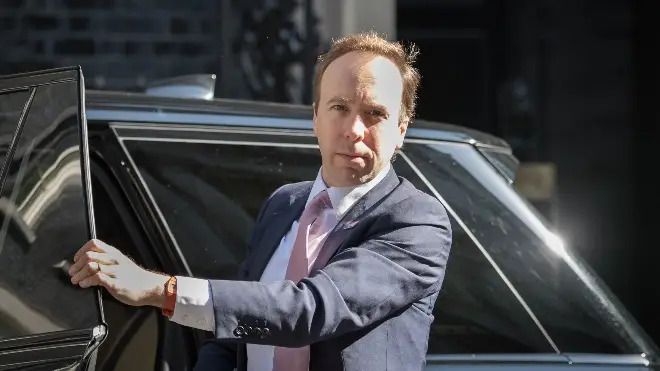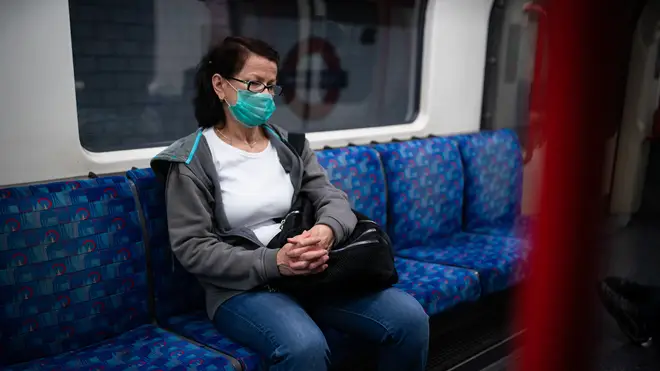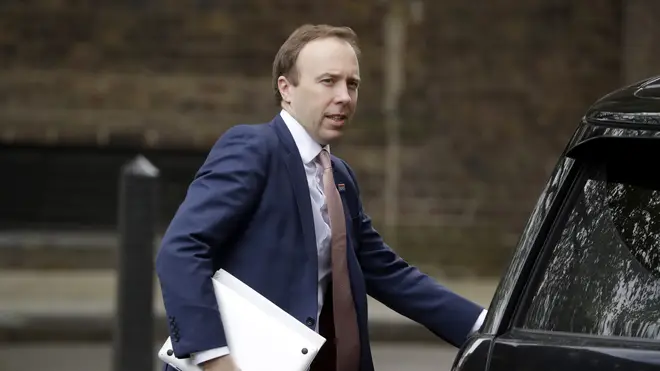
Ian Payne 4am - 7am
6 May 2020, 15:57

The UK may "have to learn to find a way to live with" coronavirus as there is no guarantee a vaccine will be found, the health secretary has warned.
Matt Hancock explained how large-scale testing and widespread tracing would be the most effective way to battle Covid-19 in the event that no vaccine was discovered.
"If a vaccine can't be found then we have to learn to find a way to live with this virus," he told Sky News.
"That means getting the numbers down and holding them down through, for instance, mass-scale testing and then tracing the virus through a combination of technology and human contact tracers."
Restrictions could still be lifted on the 1.5 million vulnerable people who have been advised to "shield" themselves for 12 weeks, even if no vaccine becomes available.
"We may well be able to release some of those measures before a vaccine is available if we can get the number of new cases right down," the health secretary said.
"If we succeed in doing that we will be able to take clinical advice on whether it is safe for those who are shielded to, for instance, hug their grandchildren. That is right at the front of my mind."

On Monday, Boris Johnson said the race to develop a vaccine against Covid-19 is "humanity against the virus," before calling on nations to pull together in response to the pandemic.
The prime minister called the world's attempts to create a coronavirus vaccine the "most urgent shared endeavour of our lifetimes."
Michael Gove had previously warned that social distancing measures would remain in place until a vaccine is developed.
The Chancellor of the Duchy of Lancaster warned that people would have to live with "some degree of constraint" until they can be immunised against the deadly disease - suggesting Britons would have to accept a "new normal."
Last month, Mr Hancock praised the "promising" progress towards a Covid-19 vaccine made by Oxford University researchers.
Meanwhile, the health secretary also told Sky News he was left "speechless" by Professor Neil Ferguson's breach of lockdown rules and subsequent resignation from Sage.
"It's extraordinary. I don't understand," he said.

Matt Hancock insists not using Nightingale Hospital is a success
Mr Hancock explained that the professor was right to resign from the scientific advice board, adding it was "just not possible" for him to continue advising the government.
"Professor Ferguson is a very eminent and impressive scientist and the science that he has done has been an important part of what we have listened to.
"I think that he took the right decision to resign."
The minister said social distancing rules "are there for everyone," no matter who they are and that restrictions are "incredibly important" and "deadly serious."
"They are the means by which we have managed to get control of this virus."
He said it was a matter for the police whether they would take any action against Professor Neil Ferguson for breaching lockdown rules.
"They will take their decisions independently from ministers, that's quite right, it's always been like that," he explained.

"Even though I have got a clear answer to what I think, as a minister the way we run the police is that they make decisions like this.
"So I give them their space to make that decision, but I think he took the right decision to resign."
The health secretary was also asked by a viewer in a Q&A session about how they could safely reopen their café once the lockdown restrictions are eased.
He explained that some businesses would be able to practice a greater level of outdoor working during the summer months.
"The business secretary is working on the rules for safe working so, when we get the rate of new infections down, we can work on how people can get back to work as safely as possible," Mr Hancock said.
"And we are going to say more about that very shortly."
He added: "There is strong evidence that outdoors the spread is much, much lower, so there may be workarounds that some businesses, for instance cafes, especially over the summer, may be able to put into place."
Listen & subscribe: Global Player | Apple Podcasts | Google Podcasts | Spotify
The minister suggested the government was unlikely to reduce the distance people should remain away from each other, with the risk of infection increasing "exponentially" once the two-metre recommended distance is shortened.
He also rejected claims the government had sacrificed people in care homes in order to protect the NHS during the pandemic.
However, he acknowledged that a lack of capacity meant it had not been possible to test everyone leaving hospitals for Covid-19 before they went into a care home.
He said: "We have, from the start, worked very hard to protect people in care homes."
Asked whether tests for people being discharged from hospital should have been introduced earlier he said: "The problem was that the testing didn't exist and we had to build that testing capacity."

Cygnus report: Matt Hancock questioned on why government didn't prepare better
Explaining why more testing was not available for people going into care homes at an earlier stage, he explained: "The testing capacity didn't exist in this country.
"We have had to build that throughout the crisis."
Asked what he could have done differently, the health secretary said: "I think it's very hard. I feel like we've put a huge amount of effort and resources behind supporting care homes from the start, maybe we should have explained that more clearly."
But he added: "It would have been wonderful if we had gone into this crisis with a global-scale diagnostics industry, in the way that Germany did.
"But we went in more like other countries like France, which similarly have had to build testing capability almost from scratch."